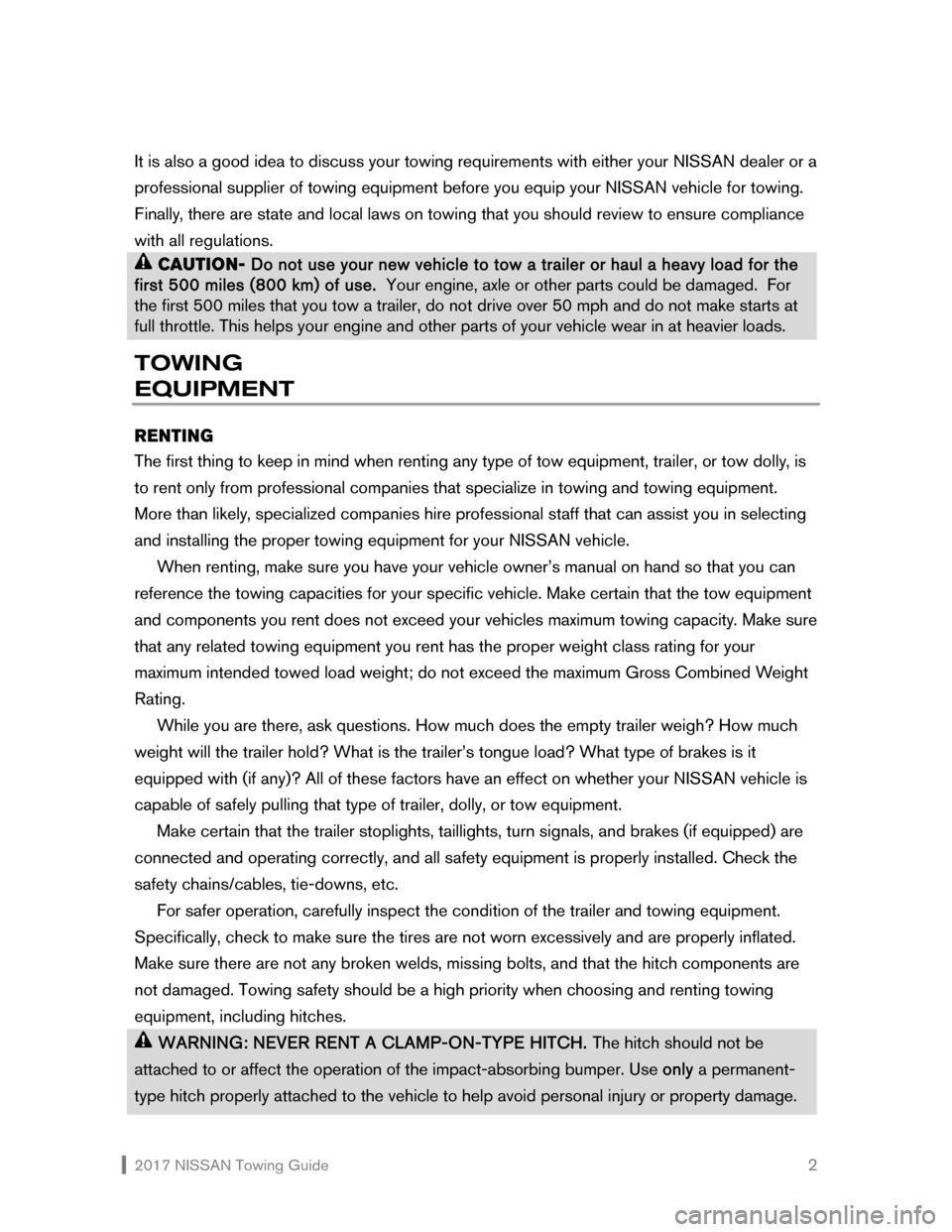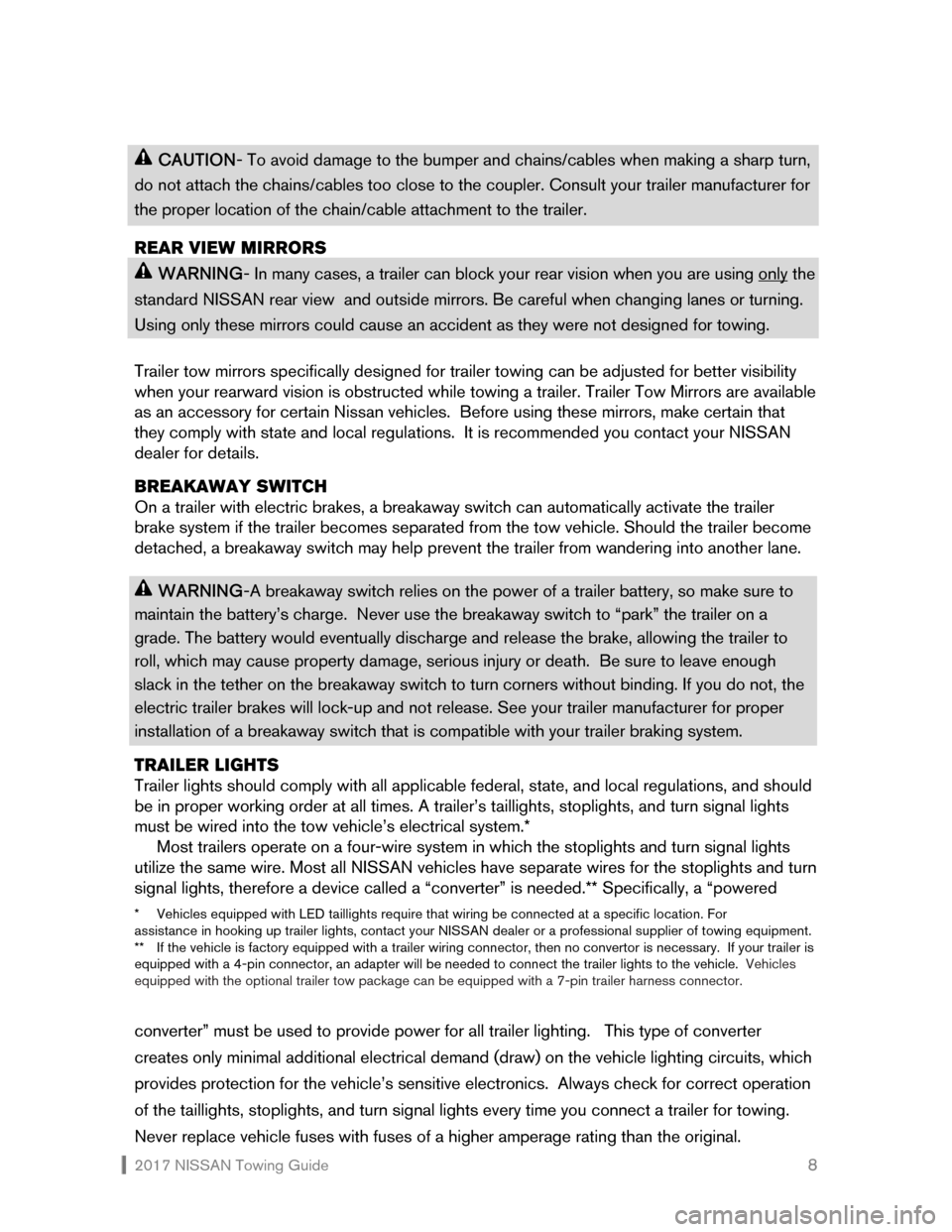2017 NISSAN GT-R turn signal
[x] Cancel search: turn signalPage 3 of 27

2017 NISSAN Towing Guide 2
It is also a good idea to discuss your towing requirements with either your NISSAN dealer or a
professional supplier of towing equipment before you equip your NISSAN vehicle for towing.
Finally, there are state and local laws on towing that you should review to ensure compliance
with all regulations.
CAUTION- Do not use your new vehicle to tow a trailer or haul a heavy load for the
first 500 miles (800 km) of use. Your engine, axle or other parts could be damaged. For
the first 500 miles that you tow a trailer, do not drive over 50 mph and do not make starts at
full throttle. This helps your engine and other parts of your vehicle wear in at heavier loads.
TOWING
EQUIPMENT
RENTING
The first thing to keep in mind when renting any type of tow equipment, trailer, or tow dolly, is
to rent only from professional companies that specialize in towing and towing equipment.
More than likely, specialized companies hire professional staff that can assist you in selecting
and installing the proper towing equipment for your NISSAN vehicle.
When renting, make sure you have your vehicle owner’s manual on hand so that you can
reference the towing capacities for your specific vehicle. Make certain that the tow equipment
and components you rent does not exceed your vehicles maximum towing capacity. Make sure
that any related towing equipment you rent has the proper weight class rating for your
maximum intended towed load weight; do not exceed the maximum Gross Combined Weight
Rating.
While you are there, ask questions. How much does the empty trailer weigh? How much
weight will the trailer hold? What is the trailer’s tongue load? What type of brakes is it
equipped with (if any)? All of these factors have an effect on whether your NISSAN vehicle is
capable of safely pulling that type of trailer, dolly, or tow equipment.
Make certain that the trailer stoplights, taillights, turn signals, and brakes (if equipped) are
connected and operating correctly, and all safety equipment is properly installed. Check the
safety chains/cables, tie-downs, etc.
For safer operation, carefully inspect the condition of the trailer and towing equipment.
Specifically, check to make sure the tires are not worn excessively and are properly inflated.
Make sure there are not any broken welds, missing bolts, and that the hitch components are
not damaged. Towing safety should be a high priority when choosing and renting towing
equipment, including hitches.
WARNING: NEVER RENT A CLAMP-ON-TYPE HITCH. The hitch should not be
attached to or affect the operation of the impact-absorbing bumper. Use only a permanent-
type hitch properly attached to the vehicle to help avoid personal injury or property damage.
Page 9 of 27

2017 NISSAN Towing Guide 8
CAUTION- To avoid damage to the bumper and chains/cables when making a sharp turn,
do not attach the chains/cables too close to the coupler. Consult your trailer manufacturer for
the proper location of the chain/cable attachment to the trailer.
REAR VIEW MIRRORS
WARNING- In many cases, a trailer can block your rear vision when you are using only the
standard NISSAN rear view and outside mirrors. Be careful when changing lanes or turning.
Using only these mirrors could cause an accident as they were not designed for towing.
Trailer tow mirrors specifically designed for trailer towing can be adjusted for better visibility
when your rearward vision is obstructed while towing a trailer. Trailer Tow Mirrors are available
as an accessory for certain Nissan vehicles. Before using these mirrors, make certain that
they comply with state and local regulations. It is recommended you contact your NISSAN
dealer for details.
BREAKAWAY SWITCH
On a trailer with electric brakes, a breakaway switch can automatically activate the trailer
brake system if the trailer becomes separated from the tow vehicle. Should the trailer become
detached, a breakaway switch may help prevent the trailer from wandering into another lane.
WARNING-A breakaway switch relies on the power of a trailer battery, so make sure to
maintain the battery’s charge. Never use the breakaway switch to “park” the trailer on a
grade. The battery would eventually discharge and release the brake, allowing the trailer to
roll, which may cause property damage, serious injury or death. Be sure to leave enough
slack in the tether on the breakaway switch to turn corners without binding. If you do not, the
electric trailer brakes will lock-up and not release. See your trailer manufacturer for proper
installation of a breakaway switch that is compatible with your trailer braking system.
TRAILER LIGHTS
Trailer lights should comply with all applicable federal, state, and local regulations, and should
be in proper working order at all times. A trailer’s taillights, stoplights, and turn signal lights
must be wired into the tow vehicle’s electrical system.*
Most trailers operate on a four-wire system in which the stoplights and turn signal lights
utilize the same wire. Most all NISSAN vehicles have separate wires for the stoplights and turn
signal lights, therefore a device called a “converter” is needed.** Specifically, a “powered
* Vehicles equipped with LED taillights require that wiring be connected at a specific location. For
assistance in hooking up trailer lights, contact your NISSAN dealer or a professional supplier of towing equipment.
** If the vehicle is factory equipped with a trailer wiring connector, then no convertor is necessary. If your trailer is
equipped with a 4-pin connector, an adapter will be needed to connect the trailer lights to the vehicle. Vehicles
equipped with the optional trailer tow package can be equipped with a 7-pin trailer harness connector.
converter” must be used to provide power for all trailer lighting. This type of converter
creates only minimal additional electrical demand (draw) on the vehicle lighting circuits, which
provides protection for the vehicle’s sensitive electronics. Always check for correct operation
of the taillights, stoplights, and turn signal lights every time you connect a trailer for towing.
Never replace vehicle fuses with fuses of a higher amperage rating than the original.